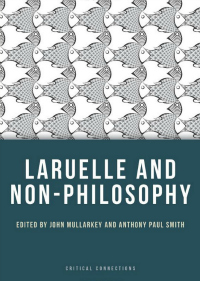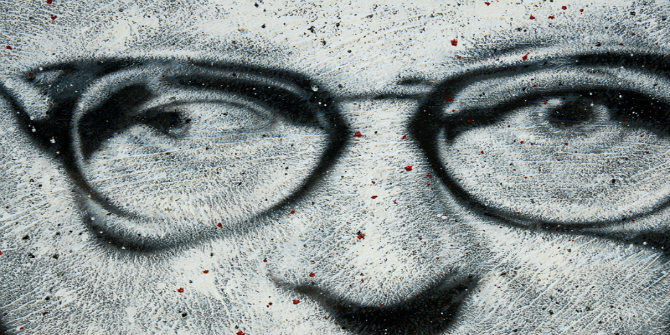Presenting critical essays on the work of arguably one of the most important French philosophers of the last 20 years, this collection provides an overview of Laruelle’s thought and an understanding of his contemporary relevance. Aiming to challenge concepts such as immanence, pluralism, resistance, science, democracy, Marxism, theology and materialism, Laruelle’s concept of ‘non-philosophy’ also expands our view of what counts as philosophical thought, through art, science and politics, and beyond. Reviewed by Miranda Nell.
 Laruelle and Non-Philosophy. John Mullarkey and Anthony Paul Smith (eds.). Edinburgh University Press. July 2012.
Laruelle and Non-Philosophy. John Mullarkey and Anthony Paul Smith (eds.). Edinburgh University Press. July 2012.
Francois Laruelle is a current French thinker who has been writing for decades, but has only recently been translated into English. Although he has a small but enthusiastic following, he is not widely known in the philosophy world, and this collection is the first significant work commenting on his ideas. For those already familiar with him, the book will satisfy with a well-rounded introduction, ten essays engaging the material in diverse ways, a contribution from Laruelle, and an intriguing interview with him as well. The more interesting question is how this volume suits a reader new to Laruelle, and whether it makes a case for his merit.
The idea for which he is best known is the “non-philosophy” of the title; a concept that initially manages to sound both appealing and a bit dubious. For the continental or interdisciplinary thinker, the alternative mode of approach is attractive, and being a non-thing has potential as a poetic claim, but Laruelle has set up a harder road in defining himself in comparison to philosophy, since in doing so he has to define all of philosophy as sharing characteristics that he avoids. His supporters will point out that this concept is not meant to negate philosophy but is intended as an extension or rethinking, but the phrase sounds quite sweeping and Laruelle does not seem to shy away from making broad statements.
So what is non-philosophy? Simply put, to engage in non-philosophy (sometimes called “non-standard philosophy”) is to understand ideas not as the observations of privileged or transcendent perspectives, but as simply another part of what exists. Non-philosophy proclaims the impossibility of explaining the Real, and instead aims for smaller projects. Because it understands itself as another object in the world, a creative addition to nature rather than any sort of mirror or overview of existence, non-philosophy is meant to achieve what philosophy never has: avoiding difference, the Other, the division between subject and object. While philosophy considers these fundamental to human experience, non-philosophy considers them fundamental merely to philosophy, due to the way that philosophy operates. As Rocco Gangle puts it in his contribution ‘Laruelle and Ordinary Life’, “Non-philosophy rejects not philosophy but only philosophy’s self-legitimating and hence thoroughly relative circumscription of its Other(s). The Stranger [Laruelle’s name for the philosophical subject] thus does not opt out of the real world, but instead sees that the world itself as defined a priori by philosophy as a form of contest and enclosure… in fact opts out of the ordinary human real” (p.78).
The trick, presumably, is how to make observations without “opting out of the ordinary human real,” whatever exactly that is. Gangle’s essay explores both Husserl’s phenomenology and Ryle’s ordinary language philosophy as earlier attempts to move philosophy’s domain, but determines both of them failures in this regard. Ultimately it is their “decisional political model” (p.77) that is problematic: by rejecting a certain form of doing philosophy, they have set up exactly that form all over again.
Yet, can we not make the same accusation of Laruelle? The answer that editors Mullarkey and Smith provide in their introduction is that we should not consider non-philosophy agonistic at all: it is of a different kind but can happily co-exist with other approaches, including some generally given little attention in intellectual realms. Mullarkey provides insight into this interpretation in his essay ‘1+1=1: The Non-Consistency of Non-Philosophical Practice (Photo: Quantum: Fractal)’ which discusses the potential of non-philosophy to shed light on performative and material expressions of thought. Laruelle has written on what he calls “non-photography” with a focus on the “photo’s non-specular manifestation of identity” (p.149, quoting Laruelle’s Non-Photography, p.112). The notion here can be extended into language and philosophy in general: words and ideas are not of or about things, but are things themselves. Non-photography and non-philosophy look not at the representations but the components of the world.
Or as we see in Alexander Galloway’s ‘Laruelle, Anti-Capitalist’ which takes up a Marxian perspective, Laruelle follows up on the idea that “the violence of capital is the violence of the equals sign” (p.193) with the conclusion that “there is no philosophy that is not too a philosophy of exchange”(p.193). In other words, where the critique of capitalist society is the endless range of quantification in the market, Laruelle is concerned with the philosophical conception of words and ideas as methods of quantification. Rather than being mysterious and potent, as it might be in a religious context or even a poetic one, language is used as a currency of exchange, explaining or reducing what a thing is.
In many ways it sounds familiar—the aim for immanence and the overcoming of the transcendental view dominated 20th century philosophy—but Laruelle’s response is that it is more simple than has been envisioned. Rather than endless repetition, or accepting Wittgenstein’s judgement [of passing over in silence], he thinks we can take up a new mode of discourse that embraces creative and performative aspects and recognizes representation and even truth as our constructs.
Instead of the more subtle or ironic approach of talking about the talking about of the event, Laruelle pushes us to deal with the ‘talking about’ as a new event in itself that should not be categorized in relation, but is rather a simple, flat part of a unified world. Some will agree with Ray Brassier’s critique ‘Laruelle and the Reality of Abstraction’, that “his attempted suspension of the pretensions of philosophy… is more indicative of a frustrated philosophical agenda than of a genuine alternative…” (p.118) (and is a credit to the collection that this perspective was represented).
Perhaps it is the potential of the agenda that inspires new thought, and to be endorsed by philosophy would in the end be the worst outcome for non-philosophy, as it would ask for clarification which might result in that world of “contest and enclosure” so disliked. In the interview at the end of the collection, Laruelle describes non-philosophy as “a style of thought” (p.243) rather than a system, and so long as it is seen as an opportunity to try something on rather than a solution to an epistemological quandary, it has the potential to provide some interesting reading.
———————————————-
Miranda Nell received her PhD from the New School for Social Research in 2012 and is currently teaching in Michigan. Her interests include aesthetic experience, the exploration of variety and flexibility in knowledge, and the importance of non-cognitive modes of expression. Read more reviews by Miranda.






